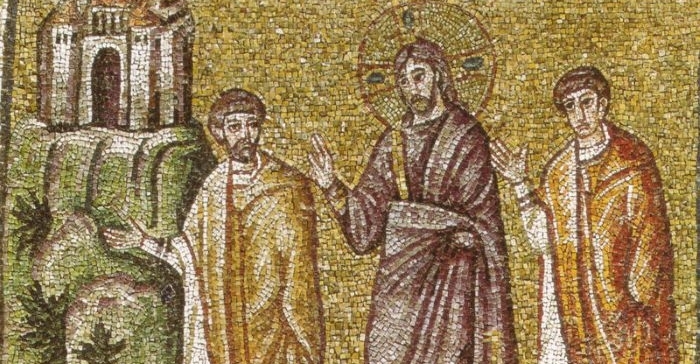PETER'S QUESTION
by Roger Wyatt | 1st February 2021 | more posts on
'Dealing with the difficult'| 1

Photograph: The calling of St Peter - https://www.europeana.eu/en/item/22/_31144 - Basilica di Sant'Apollinare Nuovo.
Peter’s Question and the Parables of the Returning Master
Luke 12:35-48
Someone recently asked me about the ‘watchfulness’ parables of Luke 12, and their meaning. Undoubtedly, they represent some of the less palatable and more challenging parables of Jesus and, as such, demand careful consideration. The parables cannot be read nonchalantly, and taken together, raise some serious theological questions concerning judgement, reward, salvation and damnation.
The chapter begins by setting a rather chaotic scene: ‘Meanwhile, when a crowd of many thousands had gathered, so that they were trampling on one another, Jesus began to speak first to his disciples, saying’ (Luke 12:1). The verse makes it clear that Jesus began his teaching by addressing his disciples, but as the chapter progresses it becomes increasingly difficult to discern who Jesus’ message is directed towards, a fact which largely explains Peter’s question: ‘Peter asked, “Lord, are you telling this parable to us, or to everyone?”’ (Luke 12:41). Peter’s question is a vital one and, sandwiched in between the two parables, in fact provides an interpretative key to unlocking the parables’ meaning.
After telling the first parable of the returning master (κύριον kyrion), Peter asks his question to which Jesus does not give a direct answer, but rather a response that is figurative and suggestive of an answer. The central figure of the second parable is still a returning κύριον, but whereas the subject of the first parable were δοῦλοι (douloi), ‘servants’, the subject of the second was a steward, οἰκονόμος (oikonomos), one in charge of the master’s house. A close reading of the text provides an answer to the relationship between the two texts, and in fact reveals two further subsidiary parables – both concretize Jesus’ teaching accordingly.
There is some necessary ambiguity in the parables of the returning master, as I have named them. The ambiguity is a theological one and primarily caused by the historical moment in which they were uttered – in that sense the ambiguity is a historical one also. Whist the parables are ordinarily and universally interpreted as relating to the final coming of the Messiah in judgement, another perhaps less obvious exposition is open to the reader, certainly in relation to the second parable. To be clear, I am not suggesting that Christ does not come in great power and glory to bring an end to human history as we know it, but I am merely pointing out that for those to whom Jesus spoke, he had only just arrived, and the majority had not yet realised it. As such, Jesus’ statement that ‘the Son of Man will come at an hour when you do not expect him’ has a new degree of impact, namely, that the many who lived and heard him did not realise that the Son of Man had arrived. Moreover, such a thought goes some way to explaining Peter’s question; Peter recognised that the Son of Man had come and now wondered in what sense the parable applied to him.
The first parable begins with a priestly motif, ‘Be dressed ready for service and keep your lamps burning’ (Luke 12:35), albeit couched in the context of a group of servants waiting for their master to come home from a wedding banquet. It should also perhaps be pointed out, that contrary to popular perception, the parable is in fact a joyous one. In his preceding teaching Jesus has just spoken warm words of comfort to his disciples: ‘“Do not be afraid, little flock, for your Father has been pleased to give you the kingdom”’ (Luke 12:32), and as such the verse provides a suitable springboard from which Jesus would deliver more encouragements to those who had put their faith in him. In fact, the parable does not read as a warning, but as an exhortation; there are no bad servants but rather an eager anticipation of the master’s arrival: ‘it will be good for those servants whose master finds them ready’ (Luke 12:38). Indeed, in the second half of the same verse the moment of his arrival is played down for those who have remained ready, ‘even if he comes in the middle of the night or toward daybreak’.
The verse that follows, verse thirty-nine, is at first reading, semantically disjointed from the first parable, and brings a darker tone to what Jesus has just spoken. Moreover, the figures of speech have been reversed placing the master of the house, οἰκοδεσπότης (oikodespotēs) in the shoes of the servants: ‘But understand this: If the owner of the house had known at what hour the thief was coming, he would not have let his house be broken into’. Put simply, the verse represents a subsidiary parable that complements Jesus’ opening parable with a warning, that even those who belong in the master’s house may suffer loss if they do not remain vigilant. It is a teaching expressed previously, but differently, in the same chapter: ‘Provide purses for yourselves that will not wear out, a treasure in heaven that will never fail, where no thief comes near and no moth destroys’ (Luke 12:33). In short, the message of the parables combined is that there is great reward in staying ready, and a failure to do so will result in loss, therefore, be ready!
The second parable has a different tone altogether, intersected from the previous parable by Peter’s question it reads as a teaching that although sharing the semantic field of the previous parable, has a completely different theological scope. Its opening line, once again, although presented in the language of servants and masters, has priestly allusions, and may well be directed at the religious authorities represented in the large crowd gathered to hear Jesus. Two possible scenarios unfold in the parable, either the chief steward administers his duty of care properly, is duly rewarded on the master’s return and is given charge of ‘all his possessions’ (Luke 12:44), or the steward grows tired of waiting and falls into moral degradation, failing to carry out the job for which he was commissioned: ‘he then begins to beat the other servants, both men and women, and to eat and drink and get drunk’ (Luke 12:45). In the second scenario the unannounced arrival of the master spells disaster for the wicked steward, he is dispossessed, and the text concludes that the master will ‘cut him to pieces and assign him a place with the unbelievers’ (Luke 12:46). As such the parable perhaps provides some commentary on the failure of Israel to recognise the coming of the Messiah, and especially the stubborn refusal of those entrusted with religious authority to remain spiritually vigilant and properly discharge their duty of spiritual care.
As above, a subsidiary parable is tagged to the end of the second parable, that leaves the reader with no doubt that Jesus’ intended audience goes beyond that of his disciples. Two new figurative servants are introduced, one ‘who knows the master’s will’ (Luke 12:47) and ‘one who does not know’ (Luke12:48). It is most likely an allusion to moral predicament of Jew and Gentile, and it is to the former that the severest judgement comes when they do not morally ready themselves. The Gentiles who are ignorant of the law however, do not escape unpunished either - God is just and will reward and punish fairly and proportionality, taking into account degrees of moral ignorance and awareness.
In fairness, it is not surprising that Peter felt confused about who Jesus was speaking to. The two parables turn out to be four, and the continual figurative switching of servant and master makes for a confusing read. However, carefully considered, Peter’s question can be seen to neatly intersect a message directed in two different directions. The first parable, and its subsidiary parabolic endnote are directed at believers, including Peter, and represent an encouragement to continue in service and readiness. The second parable and its endnote are directed at those who had been called to be God’s servants over his house, and yet, who had departed from the faith of their forefathers, fallen into moral compromise, and who failed to recognise the arrival of the promised Messiah.
In the end Peter’s question stitches together the two parables of the returning master, two parables that represent two theological realities concerning the reward of the righteous and the punishment of the wicked. Moreover, Peter as a Jewish man stood at the theological intersection, embodying the position of faith, and a redeemed Israel. Faith, in that sense, is the very means through which an individual can qualify for the merits laid out in the first parable, and avoid the punishments of the unbeliever described in the second.
